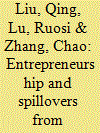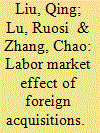|
|
|
Sort Order |
|
|
|
Items / Page
|
|
|
|
|
|
|
| Srl | Item |
| 1 |
ID:
179773


|
|
|
|
|
| Summary/Abstract |
The relations between society and non-governmental organizations (NGOs) have been relatively neglected in the field of China NGO studies, which remains largely wedded to a state–NGO problematic within a state–society framework. In this anthropological study of an NGO’s post-Wenchuan earthquake recovery programme, we adopt an actor-oriented approach to identify the main lines of tension between the strategies, rationalities, and techniques deployed by the different actors in the field. Focusing on NGO–society relations, we take the NGO not as an incarnation of society vis-a-vis the state, nor as an incarnation of the state vis-a-vis society, but as a key link in a shifting chain of state and non-state actors that aims to introduce to local society an assemblage of techniques, discourses, and values for the promotion of self-government. This ‘international development package’ is a specific form of what social scientists have theorized as ‘governmentality’. In this case study, the modalities of participation and cooperative self-government promoted within this development package are in tension with local values, social relations, and political structures. The case shows that dynamic tensions between the actors are mediated by the deployment of practices of governance that circulate between international institutions and networks, state agencies, NGOs, and local authorities and actors.
|
|
|
|
|
|
|
|
|
|
|
|
|
|
|
|
| 2 |
ID:
133190


|
|
|
|
|
| Publication |
2014.
|
| Summary/Abstract |
Using nationwide survey data in China, we find evidence of positive FDI spillover effects via entrepreneurship. After controlling for a series of entrepreneur and firm attributes, our OLS estimates suggest that private firms run by entrepreneurs with MNE work experience outperform their counterparts run by entrepreneurs without MNE work experience. To deal with the potential endogeneity in the sense that inherently more capable entrepreneurs may self-select into MNEs before launching their own businesses, we use a nonparametric way, i.e., the propensity score matching (PSM) method, to identify the MNE "treatment" effect. The PSM estimates remain consistent with the OLS evidence, and the estimates are robust to different sensitivity analyses. We further find that private firms run by MNE-trained entrepreneurs do operate differently from their counterparts in both their global involvement and internal management, which are the underlying channels of the spillovers.
|
|
|
|
|
|
|
|
|
|
|
|
|
|
|
|
| 3 |
ID:
159825


|
|
|
|
|
| Summary/Abstract |
While much of the scholarly work on the development of non-governmental organizations (NGOs) in China focuses on their relations with the state, this paper adopts an anthropological approach to explore previously understudied peasant–NGO relations through the lens of a village-level post-earthquake recovery project in Sichuan. The findings highlight three main types of gaps between the NGO and local villagers: the gaps between the villagers’ immediate needs and the NGO's long-term development plan; the gaps between the villagers’ pragmatic concerns and the “building a new socialist countryside” campaign; and the gaps between the private and collective economies. In spite of the project's unsatisfactory outcome, the NGO did not consider the project a failure. We argue that these gaps were, to a great extent, attributable to the continuing development of the institutional values of NGOs, which guide the transition of Chinese NGOs from traditional charities to modern philanthropic organizations.
|
|
|
|
|
|
|
|
|
|
|
|
|
|
|
|
| 4 |
ID:
137539


|
|
|
|
|
| Summary/Abstract |
The potential impacts of foreign acquisitions have long been debatable in both academic and policy circles in China, which have more or less shaped China's regulation policy regarding foreign acquisitions. This paper examines the causal effect of foreign acquisitions on the labor market in China with self-constructed firm level panel data. We combine the propensity score matching and the difference-in-differences techniques in our estimation to deal with the potential selection biases in acquisitions. Our results show that the impacts of foreign acquisitions in China are different from but also comparable to those in developed countries found in the literature. Specifically, foreign acquisitions have significant positive effects on the levels of wage and employment of target firms, but mildly negative impact on employment growth and insignificant impact on wage growth. The impacts show heterogeneities. We also check the potential channels of the impacts.
|
|
|
|
|
|
|
|
|
|
|
|
|
|
|
|
| 5 |
ID:
147626


|
|
|
|
|
| Summary/Abstract |
We investigate the effects of on-the-job training on firm productivity and wages using a large panel data set constituted of all large and medium size manufacturing firms in China over 2003–2007. We estimate firm productivity carefully with a recent semiparametric method and combine the propensity score matching and the difference-in-differences techniques to estimate the treatment effect of training. We find consistent evidence that i) training helps boost firm productivity and wages; ii) the higher the training expenditure per capita, the higher the increase in productivity and wages; iii) firms benefit more from training than workers. These findings are not sensitive to industrial capital intensity or firm ownership structure.
|
|
|
|
|
|
|
|
|
|
|
|
|
|
|
|
| 6 |
ID:
163428


|
|
|
|
|
| Summary/Abstract |
Studies on peasant resistance in China have been typically associated with antagonistic actions against the state. This article examines a new form of peasant resistance nested in interactions between peasants and a non-governmental organization (NGO). Through the lens of a post-earthquake reconstruction programme in which peasants cannot be simply regarded as subordinates or a powerless group, it offers an alternative view on theories of ‘rightful resistance’ and ‘everyday forms of resistance’. With rural relations become more complex, the authors argue that contextually sensitive analyses which include multilateral interactions are needed for more in-depth understanding of diverse peasant resistance in contemporary China.
|
|
|
|
|
|
|
|
|
|
|
|
|
|
|
|
| 7 |
ID:
184748


|
|
|
|
|
| Summary/Abstract |
Interactions between NGOs and rural communities in China are an important yet understudied subject. By examining a water conservation project undertaken by an international NGO, this article probes how NGOs and rural communities interact through village cadres, who have considerable influence in shaping the operation and outcomes of NGO projects. In this case, the international NGO struggled to fulfill its aspirations despite making strategic adjustments to either avoid or form alliances with the village cadres. The agency problems inherent in the multiple principal–agent relationships between village cadres and the local government, between village cadres and villagers, and between village cadres and the NGO, gave rise to complicated dynamics of selective implementation by the village cadres, thus creating local constraints on the NGO’s community project.
|
|
|
|
|
|
|
|
|
|
|
|
|
|
|
|
|
|
|
|
|